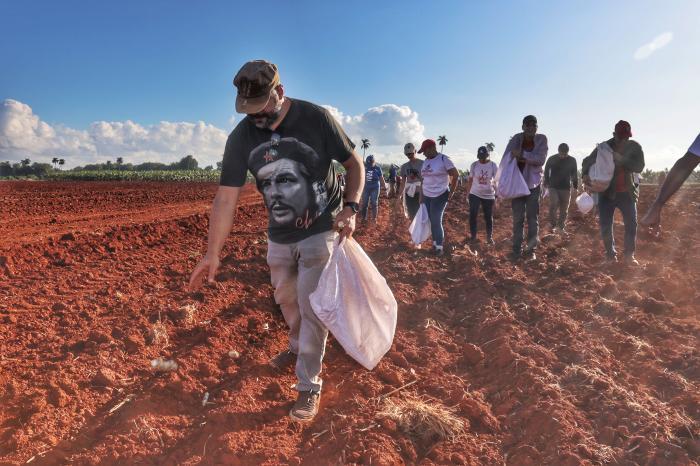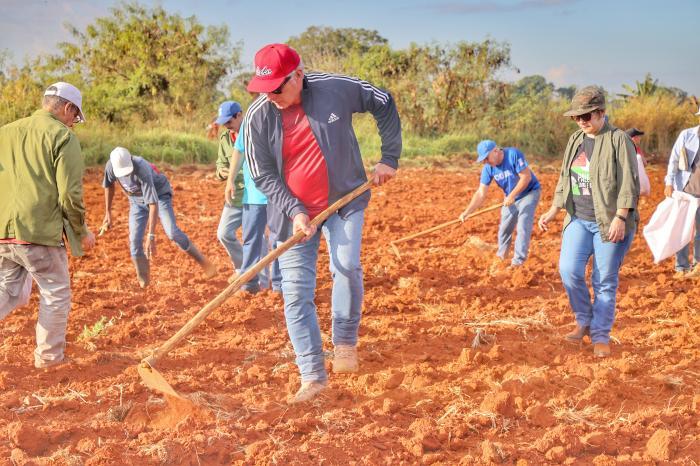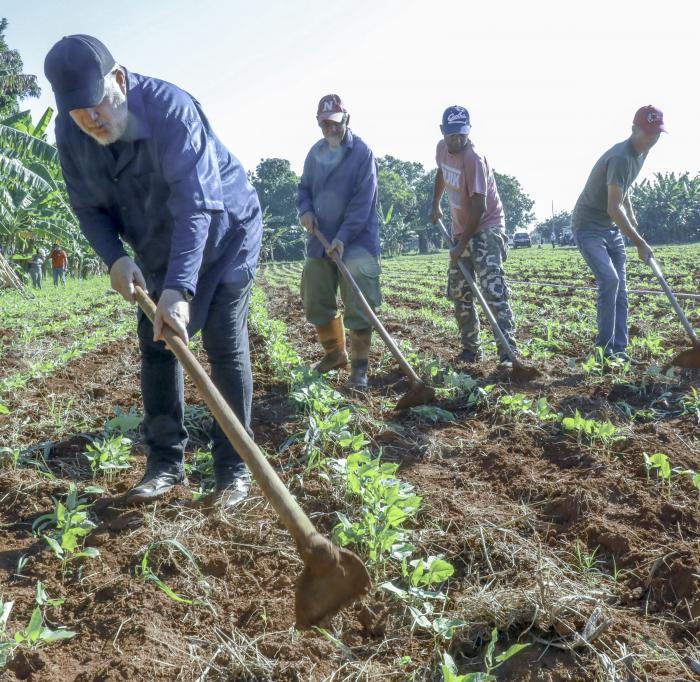
Yesterday, November 23, on the lands of the Los Tamarindos Agroindustrial Company in the province of Artemisa, the tranquility of a Sunday morning was disrupted by the enthusiasm of those who, despite having a busy week ahead, refuse to give up on finding prosperity for Cuba through daily effort, as Che Guevara demonstrated.
Among those men and women was the First Secretary of the Central Committee of the Communist Party and President of the Republic, Miguel Díaz-Canel Bermúdez. After seven days of systematic dedication to the recovery of the eastern provinces hit by Hurricane Melissa, of dialoguing with scientists and experts to find solutions to arboviruses, of receiving visitors, remembering history, and following up on matters of national priority, the Head of State joined the national volunteer work day on Sunday. He did so, combining family and duty, alongside his wife, Lis Cuesta Peraza.
Several times a year, these unpaid productive days take place, but this Sunday, November 23, was doubly special, as it coincided with the 66th anniversary of the first volunteer work carried out by Commander Ernesto Che Guevara in Caney de las Mercedes, in the territory of the current Granma municipality of Bartolomé Masó, to work on the construction of the Camilo Cienfuegos School City.
In the Artemisa region, very close to Havana, and together with his comrades from the Central Committee —among them Roberto Morales Ojeda, member of the Political Bureau and secretary of Organization— the First Secretary devoted himself to planting food crops.

After working in the fields, Osnay Miguel Colina, president of the organizing committee of the 22nd CTC Congress, reminded Che Guevara that, without shaking off the fatigue of war, he promoted by example the idea that productive and creative work would be our source of wealth.
"Since then," said Colina, "we Cubans have become much more Guevarian and much more supportive of each other. Thanks to those days, we built hospitals and schools, we planted and harvested, we went to the plains and the mountains, to wherever our arms were most needed. "
"We became cane cutters, builders, farmers, but above all, better human beings, better revolutionaries. We harvested from east to west, we gave life to new housing communities, we multiplied agricultural production, and those hours stolen from rest meant the joy of duty fulfilled for the common good."
"We have to work hard, both in rebuilding the eastern part of the country and in sanitizing neighborhoods and workplaces in the face of the complex epidemiological situation. Working, producing, creating, and fighting is the best way to sum up these times," Colina said.
In the midst of a challenging context, but with powerful motivations such as the centenary of Commander-in-Chief Fidel Castro —who defined the Revolution as the ability to emancipate ourselves— Cuban workers, the union leader pointed out, keep alive the spirit of voluntary work, unthinkable in another society in which only material interests motivate human beings.
Colina also referred to other incentives for the Cuban proletariat to carry out this national day of action, such as the call for the 22nd CTC Congress in 2026, together with the collective drafting of the preliminary bill for the new Labor Code, and the discussion of the Government Program to correct distortions and boost the economy.
UNITING ALL WILLS FOR THE COMMON GOOD
With the certainty that food production is one of the most urgent battles today, the El Chico farm, located in the capital's municipality of Boyeros, has expanded the planting of various crops, including root vegetables, grains, vegetables, and flowers, and is promoting the breeding of poultry, rabbits, and sheep.
This Sunday, Manuel Marrero Cruz, member of the Political Bureau and Prime Minister, visited this farm, founded by Celia Sánchez in the early 1970s, together with workers from the Palace of the Revolution, as part of the activities of the National Volunteer Work Day.
Planting and cleaning beans and harvesting flowers were the main tasks of the day, dedicated to the 66th anniversary of the first volunteer work carried out by the Heroic Guerrilla, Ernesto Che Guevara.
Jorge Revé Moracén, the farm's agricultural manager, spoke about the use of the three horses they have and highlighted the importance of productive activities such as those carried out on Sunday. The support and accompaniment are felt, he said, and it shows that we are standing strong and must continue fighting.
Food production is everyone's business, and it is up to each of us to do our part to overcome the complex economic situation facing the country. We cannot wait for someone to come and give us what we are capable of producing ourselves. And for the workers at the Palace, it is a source of pride to work today on this farm, which is so closely linked to Celia's legacy, said Danisly Hernández Brito, a member of the Stenographic Department.
Milagros Morales del Toro, a member of the Complaints and Petitions Department, also spoke about the motivations that drive young people at the Palace of the Revolution to join forces for the common good. In her opinion, this is "a very important call to action that is not limited to this weekend, but has been taking place every month, both at our workplace and in other places where our contribution is needed."
On Sunday, workers at the Palace of the Revolution also carried out cleaning, pruning, and sanitizing tasks in the institution's areas, confident that unity, consistency, and active participation by all are the keys to overcoming adversity.
















